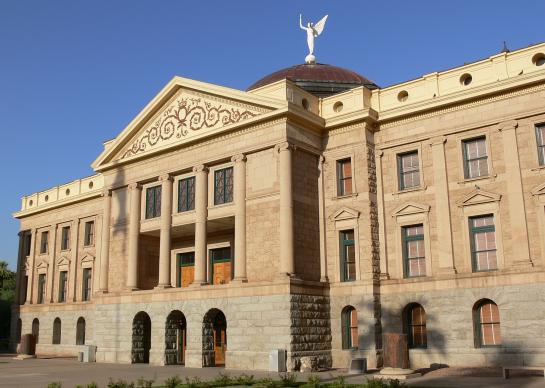AZ Legislative Update - January 21, 2022

Legislators focused on policy discussions this week, navigating around lawmakers’ medical absences by rearranging committee assignments when necessary. Several high-profile bills advanced through committees, including legislation outlining how teachers can talk about race, how electric utilities are governed, whether concealed weapons should be allowed on campus, and the role biological sex should play in school sports.
The House Judiciary Committee canceled a vote on a contentious proposal that would create employer liability under certain conditions if the employer required its employees to receive a COVID-19 vaccine. The bill is rescheduled for a hearing next week. It is one of many proposals related to vaccine mandates that lawmakers have introduced so far this year.
A House committee voted 8-1 for a three-year continuation of the Arizona Department of Corrections, Rehabilitation & Reentry, rather than the usual eight years, due to concerns about prison operations. A similar Senate committee disagreed, however, and recommended an eight-year continuation for the agency. The discussion will continue in both the House and Senate.
Not everything was controversial, and many bills passed with strong bipartisan or even unanimous support. Legislators advanced proposals to prioritize funding for homeowners whose property was damaged because of wildfire, allow dentists to administer Botox, expand AHCCCS coverage for chiropractic care, and provide food assistance benefits for ex-inmates. The Senate Finance Committee approved the creation of a State Finance Review Task Force to study how Arizona government obtains and spends money.
What's Next
Legislators have introduced more than 1,000 proposals, and that number will continue to climb. The clock is ticking: There are just four weeks left for bills to make it through their assigned committee hearings and many big ideas to consider – including a cap on school spending, tax cuts, and changes to election laws and water policies. There’s a lot to watch this year at the legislature.
Budget Update: Billions in Surplus
A panel of economists agreed this week: Arizona has a lot of money to spend. The legislature’s nonpartisan budget office estimates that lawmakers will have a surplus of $3.1 billion to spend in the next fiscal year, which begins July 1. The state’s main bank account – the General Fund – grew by 18% over the last 18 months.
The Finance Advisory Committee, which advises the legislature about economic forecasts, said there are a variety of reasons for the continued growth in state revenues:
- The federal government’s COVID-19 funding bills directed $78 billion to Arizona and helped increase personal income by 8.6%.
- Some Arizonans are slowly spending the savings they put aside since the pandemic began.
- Throughout the pandemic, Arizonans have spent money on things rather than experiences. Buying furniture online, for example, is taxed differently than going to see a movie. As people stayed home and bought products, the state’s sales tax numbers climbed.
- Corporate growth and stock market gains across the country boosted Arizona’s economy, as did rising housing prices.
The economists warn, though, that tax revenues will not continue to grow at this rate and there are a lot of uncertainties. The pandemic has had an unusual effect on many aspects of the economy. The legislative budget staff believes only $1 billion of the $3.1 billion surplus will be available for ongoing priorities. (Here’s how legislative economists forecast state revenues.)
The outcomes of two major court cases will dramatically affect these forecasts, as well, since they will decide whether $939 million will go into the education fund created by Proposition 208 and whether the legislature’s big income tax cuts will go into effect. These issues will impact state revenues so dramatically that Governor Ducey’s budget director recently said budget negotiations can’t really begin until the courts act.
These economists hope the legislature takes one message away from their observations: The budget situation is strong, but you don’t need to spend all your money right now.
Budget Update: Agencies Share Their Wish Lists
The House and Senate Appropriations Committees and Subcommittees have begun a multi-week process to understanding state agency budget requests. The briefings are important because they serve as a foundation for future budget negotiations. Click here to see the committee presentations.
In the Elections
Members of the Arizona Independent Redistricting Committee aren’t getting along. The Attorney General and Secretary of State disagree about requirements for the online signature-gathering system. Two highprofile Arizona senators won’t run against each other. Kimberly Yee wants to be Arizona Treasurer again. More Arizonans are registering as independents.
In the Courts
A Maricopa County Superior Court judge said Governor Ducey had authority to cut unemployment benefits last year. An Arizona court wants to have a talk with Doug Logan, the former director of Cyber Ninjas, about his company’s role in the Arizona Senate’s ballot recount.
In the News
Arizona’s still fighting the federal government’s ban on using COVID-19 aid funds for tax cuts. The U.S. Department of Agriculture announced a new plan for wildfire prevention. Federal aid funds gave some Arizona law enforcement workers a raise. The legislature has enacted a lot of license plate options. Arizona’s legislature isn’t the only one dealing with debates about COVID-19 protocols.
On the Bright Side...
Goldfish can drive and dogs can understand other languages.